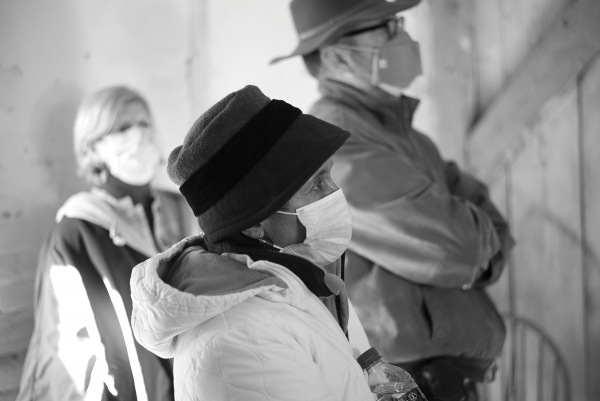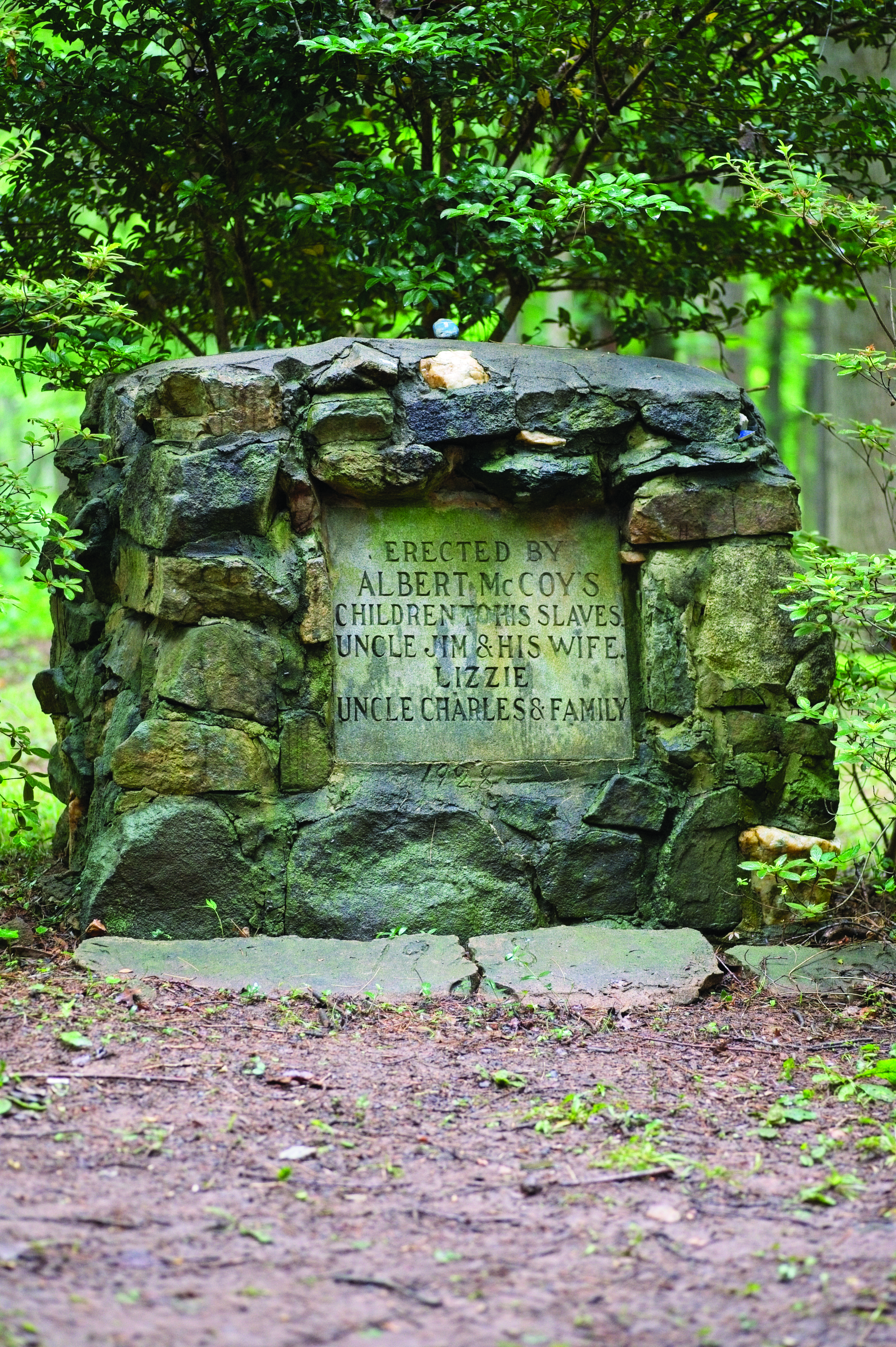Disciple: It’s About Time

Your invitation to join a diocesan quest
By the Rev. Canon Lindsey Ardrey
Editor’s note: The following piece is adapted from the Rev. Canon Lindsey Ardrey’s address to the 208th Annual Convention.
“Now there was a woman who had been suffering from hemorrhages for twelve years…She had heard about Jesus, and came up behind him in the crowd and touched his cloak, for she said, ‘If I but touch his clothes, I will be made well.’ Immediately her hemorrhage stopped; and she felt in her body that she was healed of her disease.” (Mark 5:25, 27-29)
[Image: The congregation of Holy Family, Chapel Hill, recently took a pilgrimage to Stagville Plantation in Durham. Photo by Jan Yarborough]
The moment I read this full passage and wept was the first time I realized how much I needed Jesus. It was the first instance of Scripture becoming more for me than just a beautifully ancient book with great stories. On that day, my entire body ached, and I was contemplating the road ahead of me. I had recently been diagnosed with an autoimmune condition, and my future looked vastly different from what I’d imagined. My reoriented life was going to be full of doctor visits, pharmacy runs and organizing my pill box. It felt like my body had betrayed me. I would have to put my trust in the hands of modern medical practitioners and stake my life on their expertise. Yet my spirit longed for something more. So I grabbed my Bible and found myself within the pages of Mark’s gospel, reaching out to touch any scrap of Jesus that I could. Jesus felt me touch the fringes of his cloak. He felt power flow from him to me. He searched for me, a scared and hurting woman, in a dense crowd. I fell before his feet and cried holy tears, and then he looked into my eyes and called me Daughter. The honorific had new meaning and came with the promise of healing greater than any doctor could prescribe. Though I am still navigating life alongside an autoimmune condition, I lean into Jesus’ promise.
I share this piece of my story because it lays the foundation for the trajectory of our shared ministry for reparations and restitution. Jesus and the process of healing will necessarily center our efforts. Many folks might like for me to write and provide the most suitable, understandable and profound definitions for reparations and restitution—then speak eloquently about the difference between the two. That is a worthy endeavor, perhaps even a necessary one. But to risk disappointing you, I’m not going to do that in this medium. It may be naive of me, but I trust that most of us reading this pay enough attention to popular discourse to have an inclination toward this conversation, no matter your opinion on the topic. Don’t worry, we have plenty of glossaries, books and curricula for you to check out on our website, but in this moment, I’m going to ask something else of you. I would like for you to join me on a spiritual quest. Like every epic hero we’ve ever loved, we’ll need to summon all the courage we can find, take one look behind us and journey ahead.
THE QUEST
Your mission, should you choose to embark upon this quest, will take everything you have at your disposal. You’ll need to surrender over-intellectualizing matters of heart and soul. You’ll be asked to question who you are and from whom and where you came. You’ll be charged with re-examining the history your forebearers passed down to you. You’ll be required to get comfortable with being wrong and not having all the answers. You’ll be tasked with unlearning and relearning the ways you view the world. You’ll be commissioned to mine the depths of your soul and practice new ways of listening. You don’t need to pack a bag, but it will take all that you have. It’s a lot to ask, and I’m afraid that I’m the worst salesperson out there, but it’s no less than what Jesus asks of his followers. And that’s exactly who we are—Jesus followers. Professed disciples and fellow sojourners who are imbued with power and authority to proclaim the kingdom of God and heal in the name of Jesus (Luke 9:1-2). In the name of the great Healer, we are responsible for locating the root cause of open wounds and curing our ailing communities. That’s the quest.
But did I mention that time travel would be involved? This ministry is all about time. The past, our current reality and the future. On this quest, you will journey into yesteryear to meet our forebearers. Read the words they wrote and fill in the gaps with historical data. Approach history as a sacred text by using each of your senses to experience events. Get curious and ask the characters of bygone eras questions. Wrestle with contradicting truths and negotiate between earlier and current versions of the stories you love. Take the plethora of articles written by our historiographer and documents compiled by our archivist into your hands and lovingly mark them up like a well-worn textbook. Then, travel back to today and delineate the patterns and common threads. Ask yourself what emotions course through your body: embarrassment, shame, confusion, defiance? Turn to your fellow sojourners, the people you call community, and pray through it all. Hand it all to God, and do it all over again.

As part of your time-traveling spiritual quest, you can read through “Initial Report: The Episcopal Diocese of North Carolina’s History of Institutional Racism (Founding through 1960),” located on the Reparations and Restitution page of our diocesan website. It’s an emotionally heavy read, and you may ask yourself, “Why? Why subject myself to this? Why open wounds and historic vaults that have been closed?” Those are worthy questions with a myriad of possible answers, but ultimately the answer lies in the truth that the wounds never healed. Parts of our diocesan Body of Christ are hurting and have been hurting, often directly because of internal harms. When that happens, it means that all of us are hurting. But if you find yourself resistant, know that in every epic tale, the hero(ine) comes to a crossroads. A startling or unprecedented revelation presents itself, or some insurmountable betrayal surfaces. They can either turn back and return home or face the challenges, knowing that either way they will be transformed through the process. If you decide to forge ahead, grab the report’s companion guide “Initial Report: Praying Through a Difficult History” and gently follow the prompts for reflection and meditation.
[Image: St. Mark’s, Huntersville, is honoring the formerly enslaved people buried in the McCoy Cemetery. Photo courtesy of St. Mark’s]
Amidst all of this time traveling, equipped with newly acquired knowledge and a diligence to prayer, you may come to the same conclusion that I have come to—that it’s about time we offered redress. Like me, you may feel that it’s about time we stepped beyond written statements and apologies. It’s about time that we take our years of self-examination and translate it into something tangible. It’s about time that we stopped clutching our purses and material assets and instead clutched our souls. It’s about time that we worried less about what we may lose and instead focused on what we have to gain. I don’t know about you, but I am tired. I’m tired of running away from the ghosts of the past and pretending they are not there. I’m tired of the constant reports reminding us that our church is in decline and that we’re hemorrhaging members, money and property. I’m ready to live life abundantly rather than out of scarcity. If you are as tired as I am, and you’re ready to breathe God’s breath of life into ourselves, then join in. Our church is declining because we have let wounds fester. We are the woman in Mark’s gospel, and the hemorrhaging has been going on far longer than 12 years. But the woman reached out to Jesus, and it’s about time that we did the same. We sought out all the professionals we could, and now it’s finally time that we reach out to our great Healer.
For those of you who acknowledge the perils of the road ahead and say yes to this spiritual quest: Welcome. Some of us are new to this work, and others have been true to it for years. We are all at different starting points in this journey, so begin where you need to. A team of clergy and lay leaders is positioned to encourage and coach you and your congregation through this spiritual quest. Even though I said that you would not need a bag, the Reparations and Restitution page on the diocesan website does house all of the resources you may need for an easy on-ramp into this work. As we journey together, for some of us the pace will be too slow. For others, it may seem like we’re charging full steam ahead…too fast, too soon. But what matters is that we start, that we continue showing up and that we all walk this road together.
Let us reach out and grab the fabric of Jesus’ clothes together.
The Rev. Canon Lindsey Ardrey is the canon missioner for diocesan restitution and reparations ministry for the Diocese of North Carolina.

Join the Quest
Quest
/ kwest / | noun
1) An act or instance of seeking
/ kwest / | verb
1) To search for 2) To ask for
- Merriam-Webster Dictionary
Visit episdionc.org/reparations-and-restitution.
If you are ready to join this quest, the Diocese of North Carolina now offers resources to get you started or take you deeper on your journey. Among the resources you’ll find:
- “Initial Report: The Episcopal Diocese of North Carolina’s History of Institutional Racism (Founding through 1960)” by the Rev. Rhonda M. Lee
- Historical overview of the diocese’s complicity and perpetuation of institutionalized and systemic racism.
- Explores a troubling past by tracing the history of church leaders and prominent Episcopal community members; provides an initial narrative for some experiences of historically Black congregations; poses questions about past financial gains and resource allocations.
- Commissioned by Bishop Sam Rodman with the support of the diocesan Reparations and Restitution Committee.
- “Initial Report: Praying Through a Difficult History”
- An abridged version and companion guide to “Initial Report: The Episcopal Diocese of North Carolina’s History of Institutional Racism,” complete with prayers, reflections and prompts for further engagement.
- “Initial Report: Praying Through a Difficult History"
- A “choose your own adventure” of sorts for those interested in the journey ahead.
- An evolving and living document with a tiered approach to help you enter the work as your experience necessitates
Tags: North Carolina Disciple / Racial Reckoning, Justice & Healing
